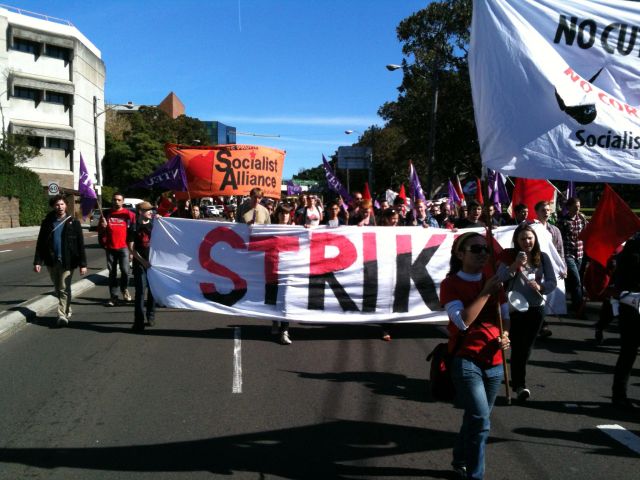
Socialist activists are involved in political struggles across many different issues. From equal marriage rights to defending education, refugee rights to the environment, socialists help organise and lead these campaigns, and seek to win important political reforms around them.
It might seem contradictory for socialists to fight for reforms. Since socialists oppose capitalism and the capitalist state, why is it that they campaign for measures that encourage the expansion of the capitalist state?
For example, winning equal marriage rights is a reform that would end one form of discrimination against lesbian, gay, bisexual, intersex and transgender people. Likewise, winning an end to mandatory detention of asylum seekers is a reform that will improve the lives of individual refugees immensely.
But neither of these demands will change the capitalist system by themselves.
It is a question of how a socialist society can be won. It is wrong to imagine that socialists should remain pure by not interacting with the state or state power.
It is the opposition to capitalism, and the desire to build a better society, that causes socialists to engage in social movements for reforms in the present. Winning reforms is one step along the road to changing the system.
These reforms can be supported by a broad cross-section of the community, not just socialists, and that is exactly the point.
Revolutionary political consciousness is not something that emerges spontaneously. It can only be cultivated in actual political struggle in the real world through the interaction of real conditions with socialist ideas.
People will not wake up one morning and decide to be revolutionaries. But they can be convinced of it through the very act of trying to achieve real changes in their everyday lives.
A good example is the burgeoning power of the student movement in Chile. Chile is a nation where, under the US-backed dictatorship of Augusto Pinochet in the 1970s and ’80s, the education system was almost completely privatised.
This has led to an incredibly unequal and unjust system of education for the vast majority of young people. However, in recent years, large-scale protest movements have emerged to openly challenge this system of education and attempt to force the government to grant free and universal education for all students.
Over the past two years, large university occupations, in many cases led by youth from several socialist groups, have shut down the capital city of Santiago with enormous demonstrations.
The demand for free universal education is a reformist one. It doesn’t require the overthrow of capitalism, nor does it challenge the basis of the state. In fact, it calls for the expansion of the welfare state to an even greater extent. Regardless of this, it is incredibly important.
It is these struggles that elevate the political consciousness of people, in this case, an entire generation of working-class Chileans. This is an entire generation who are experienced with fighting the police, organising strikes and occupations, and calling democratic assemblies.
The “reformist” political struggle is the place that turns ordinary people into activists and activists into revolutionaries. It is when the state uses coercion that people truly realise the repressive nature of the state.
“Those who do not move do not notice their chains,” as the German Marxist, Rosa Luxemburg said. On the flip side, when people do finally move, their chains become clear.
This is why socialists must engage in social movements in the here-and-now. Not because we want to change capitalism “for the better” or give it a “human face”, but because the masses of people need to learn, in the struggle itself, how to organise as a class and challenge the status quo.
In essence, by daring to struggle, we dare to win.
The immediate demands of the working class are the point from which socialists must build. Only from there can we build the movement necessary to win socialism in the long run.
To defeat the power of capitalism and its state, the socialist movement needs to mobilise millions of people to engage in political action. This level of consciousness does not, to use former Venezuelan president Hugo Chavez’s phrase, “drop fully formed from the sky”.
In fact, it requires socialists to be engaged in the movement from the start, taking part in its victories and defeats and trying to take the collective lessons learnt and maintain them, through generations of struggle, so that we can eventually win these struggles for good.